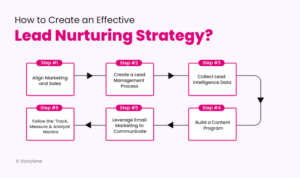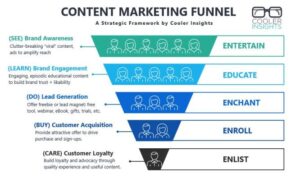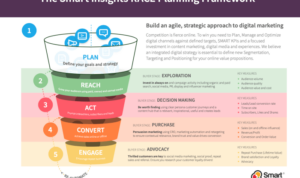Developing an Omnichannel Marketing Strategy dives deep into the world of modern marketing, exploring the key components and benefits of this comprehensive approach that drives business growth and success. From data analytics to customer experience, this strategy is a game-changer for businesses aiming to stand out in the crowded digital landscape.
As we unravel the importance of omnichannel marketing and its impact on customer journeys, get ready to discover how successful companies are leveraging this strategy to create seamless and personalized interactions across various channels.
Importance of Omnichannel Marketing Strategy
Developing an omnichannel marketing strategy is crucial for businesses in the digital age because it allows companies to create a seamless and integrated customer experience across all channels. This approach ensures that customers receive consistent messaging and branding, no matter where they interact with the brand.
Examples of Successful Companies, Developing an Omnichannel Marketing Strategy
- Apple – Apple has successfully implemented an omnichannel marketing strategy by integrating their online store, physical retail locations, and customer service channels. Customers can seamlessly move between these channels, enhancing their overall experience with the brand.
- Starbucks – Starbucks is another example of a company that has effectively utilized omnichannel marketing. Their mobile app, rewards program, and in-store experiences are all interconnected, providing customers with a cohesive and personalized experience.
Benefits of Omnichannel Approach
- Improved Customer Experience – Omnichannel marketing ensures a consistent and personalized experience for customers, leading to higher satisfaction and loyalty.
- Increased Sales and Conversions – By providing customers with multiple touchpoints to interact with the brand, businesses can increase sales and conversions.
- Data-driven Insights – Omnichannel strategies allow companies to gather data from various channels, providing valuable insights into customer behavior and preferences.
- Brand Cohesion – Maintaining a unified brand presence across all channels helps reinforce brand identity and messaging, leading to stronger brand recognition.
Components of an Omnichannel Marketing Strategy
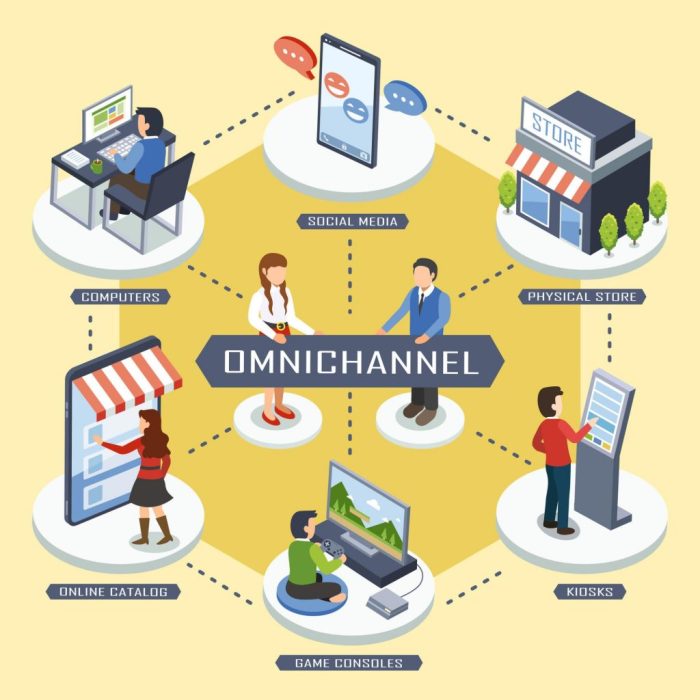
Omnichannel marketing strategies consist of various key components that work together to create a seamless and integrated customer experience across multiple channels. These components are essential for businesses looking to engage with their customers effectively and drive sales.
Data Analytics in Optimizing an Omnichannel Approach
Data analytics plays a crucial role in optimizing an omnichannel approach by providing valuable insights into customer behavior, preferences, and interactions across different channels. By analyzing data collected from various touchpoints, businesses can better understand their customers’ journey and tailor their marketing strategies to meet their needs effectively. Utilizing data analytics allows businesses to personalize marketing messages, recommend products based on past purchases, and identify trends to improve overall customer experience.
Integration of Various Channels
In a cohesive omnichannel marketing strategy, integration of various channels such as social media, email, website, and physical stores is essential to provide a seamless experience for customers. By connecting these channels and ensuring they work together harmoniously, businesses can create a consistent brand message and customer experience. For example, a customer may receive a promotional email, visit the website to browse products, and then make a purchase in-store, all while experiencing consistent messaging and branding across each touchpoint. This integration helps build customer loyalty and drives engagement across all channels.
Customer Experience in Omnichannel Marketing: Developing An Omnichannel Marketing Strategy
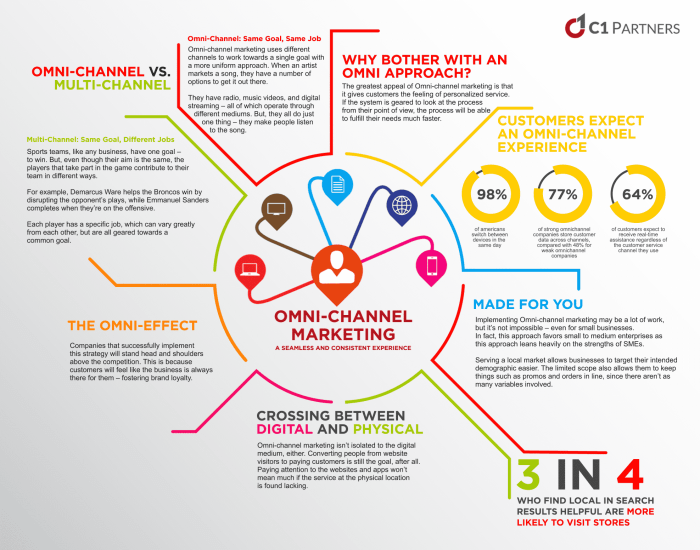
Omnichannel marketing has revolutionized the way businesses interact with their customers, providing a seamless and personalized experience across various touchpoints. By integrating multiple channels such as online platforms, social media, physical stores, and mobile apps, companies can enhance the overall customer experience in numerous ways.
Enhanced Personalization
- Through an omnichannel strategy, businesses can gather data from different channels to create a comprehensive view of each customer. This allows for personalized recommendations, targeted promotions, and tailored communication based on individual preferences and behaviors.
- For example, a customer browsing products online may receive personalized recommendations based on their previous purchases or online activity. This level of personalization not only enhances the customer experience but also increases the likelihood of conversion and customer loyalty.
Consistency and Seamlessness
- Consistency is key in providing a seamless customer journey across all channels. Whether a customer interacts with a brand online, in-store, or through social media, the experience should be cohesive and unified.
- By maintaining consistency in branding, messaging, and service quality, businesses can build trust and credibility with their customers. This ensures that customers receive a consistent experience regardless of the channel they choose to engage with, leading to increased satisfaction and loyalty.
Technology and Tools for Implementing Omnichannel Strategies
In the digital age, leveraging technology and tools is crucial for executing successful omnichannel campaigns. Let’s explore the role of CRM systems, marketing automation, AI, customer data platforms, mobile applications, and chatbots in enhancing the omnichannel experience.
CRM Systems
CRM systems play a vital role in omnichannel marketing by centralizing customer data and interactions. They enable businesses to track customer behavior across various touchpoints, providing valuable insights for targeted messaging and personalization.
Marketing Automation and AI
Marketing automation tools streamline repetitive tasks, allowing marketers to focus on strategy and creativity. AI-powered solutions further enhance campaign performance by analyzing data, predicting customer behavior, and delivering personalized content in real-time.
Customer Data Platforms for Personalization
Customer data platforms consolidate customer information from multiple sources, enabling marketers to create detailed customer profiles. By leveraging these platforms, businesses can deliver personalized messages and offers tailored to individual preferences and behaviors.
Mobile Applications and Chatbots
Mobile applications and chatbots are instrumental in providing seamless omnichannel experiences. Mobile apps offer convenient access to products and services, while chatbots provide instant support and guidance to customers across various channels, enhancing engagement and satisfaction.
